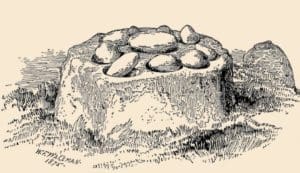Ireland’s Brewing History: Uncovering the Myths and Traditions of Irish Whiskey and Beer

Updated On: April 20, 2024 by Yasmin Elwan
The intricate tapestry of Ireland’s brewing history is as rich and complex as the flavours of its iconic beverages. From the earliest days when monastic communities introduced distilling techniques from the Mediterranean, Irish brewing has developed a distinct identity. A tradition that dates back to 1000 AD, it has been entwined with Ireland’s social fabric, adding a unique blend to the island’s culture. The brewing of beer has evolved over the centuries, giving rise to the famed dark stouts and ales that are now synonymous with Irish heritage.

Whiskey distilling in Ireland grew concurrently with beer, with the spirit enjoying a storied evolution of its own. The term itself, deriving from ‘uisce beatha’, meaning water of life, underlines the cultural importance of this esteemed spirit. Throughout Ireland’s history, key figures and establishments have played pivotal roles in the development and propagation of both Irish beer and whiskey, leaving a legacy that contemporary breweries and distilleries strive to uphold. These days, the craft beer movement and modern distilling techniques are propelling Irish drinks into a new era while still honouring the time-honoured methods of the past.
Origins of Irish Brewing
The rich tapestry of Irish brewing spans thousands of years, rooted in ancient practices and honed by monastic dedication. Our journey into the origins of this craft unveils a heritage steeped in tradition and a unique cultural identity.
Bronze Age Beginnings
Irish brewing found its origins in the Bronze Age when inhabitants of Ireland crafted their beverages using native cereals. Archaeologists have uncovered evidence of these early brewing endeavours, signifying the importance of beer in ancient Irish society. The earliest Irish beers were likely created from barley crops, with the fertile lands of Ireland providing ideal conditions for this staple ingredient.
Monastic Brewing Traditions
By the time of the Middle Ages, Irish monks had become the custodians of brewing knowledge. Within the stone walls of Irish monasteries, brewing transformed into a refined practice. These monastic brewers crafted ales imbued with regional character, adhering to strict traditions that dictated their brewing calendar. Not only did they brew for their communities, but they also provided hospitality to travellers, with beer often deemed a nourishing alternative to the unreliable drinking water of the era.
The Evolution of Ireland’s Brewing History
In this exploration of brewing history, we trace the transformation of Irish beer from its earliest forms to the iconic styles enjoyed today.
From Ales to Porters and Stouts
Traditionally, ale was the bedrock of Irish brewing, a simple but flavourful beer without the use of hops. As brewing methods progressed and tastes evolved, darker and richer beers emerged, including porters and stouts. The porter began in London style, yet it made its way to Irish shores, where it transformed into dry and distinct Irish stout. Renowned breweries like Guinness mastered this style, and Guinness’s take on the stout became synonymous with the Irish identity.
The Rise of Irish Red Ale
Distinct from the stout is the Irish Red Ale, a style characterised by its reddish hue and balanced malt flavours. This style stands as a testament to Ireland’s brewing diversity, offering a caramel sweetness offset by a subtle hop presence. The Irish Red Ale might not have the international renown of the stout, yet it remains an essential part of Ireland’s brewing heritage and a favourite among connoisseurs.
Irish Whiskey: Crafting the Spirit of Ireland
Irish whiskey’s remarkable journey, from its monastic origins to its position as a world-renowned spirit, embodies the heart of Irish tradition and innovation. Our tale is woven with the expertise of centuries and modern advancements, celebrating a craft that’s quintessentially Irish.
Distilling Processes and Innovations
We have perfected the art of whiskey distilling, utilising both time-honoured methods and inventive techniques. Traditionally, Irish whiskey is triple-distilled, a process that makes it notably smooth and pure. The choice of ingredients is just as crucial, with a blend of malted and unmalted barley, sometimes accompanied by other grains, distinguishing our whiskey from others.
The distillation begins with milling the grains, converting the starches to sugars, and adding yeast to ferment the mash. It then passes through a series of copper pot stills, where each round of distillation further refines its character. Modern innovations include the use of computer-controlled processes to ensure precision and consistency, marrying the reliability of new technology with the soul of traditional craft.
The Unique Profile of Irish Whiskey
What sets Irish whiskey apart is its distinctive flavour profile, which is smooth with a warm, gentle finish. Our whiskey is known for its lack of peatiness, contrasting with some of our neighbours’ spirits. Instead, the essence of roasted barley and the subtle notes of fruit, vanilla, and spice define our whiskey’s palette.
The maturation process, where the spirit rests in oak casks, imparts complexity and depth. These barrels, with their own histories of containing bourbon, sherry, or even port, infuse a tapestry of tastes, culminating in a whiskey that’s as rich in stories as it is in flavour. It’s this meticulous attention to every detail of the production process that captures the true spirit of Ireland in each glass.
Key Figures and Breweries
In this section, we’ll explore some of the pivotal personalities and establishments that have shaped the rich tapestry of Ireland’s brewing and distilling heritage.
Arthur Guinness and His Legacy
Arthur Guinness was a visionary brewer who founded the Guinness Brewery in 1759 at St. James’s Gate, Dublin. His contribution to the brewing industry is monumental, with Guinness’s stout becoming almost synonymous with Irish beer worldwide. The signature rich, creamy head and distinctive taste of Guinness stout remain a testament to Arthur’s brewing innovation.
Influential Breweries and Distillers
John Smithwick is another key figure, having established Smithwick’s Brewery in 1710, which operated on the site of an old Franciscan abbey where monks had brewed ale since the 14th century. The legacy of Franciscan Abbey thus lives on through Smithwick’s ale, with its history deeply intertwined with Ireland’s ecclesiastical past.
As for influential establishments, aside from Guinness and Smithwick’s, Ireland has been home to a number of noteworthy distilleries that have contributed to its acclaim in the spirits world. These distilleries have been producing premium whiskeys for centuries, enhancing the reputation of Irish spirits on the global stage.
Our cultural fabric is interlaced with the evolution of these breweries and distilleries, which continue to celebrate and preserve Ireland’s storied history with every pint and dram.
Cultural Significance and Social Influence
The brewing traditions of Ireland are deeply entwined with the nation’s identity and social fabric. Pubs, in particular, are central to Irish social life, serving as hubs for community interaction and cultural expression.
Pubs: The Heartbeat of Irish Social Life
Irish pubs are renowned worldwide for their vibrant atmosphere, hearty hospitality, and role as communal centres. These establishments are much more than mere places to drink; they are the social hubs where locals and visitors alike come together to share stories, enjoy music, and celebrate life’s milestones. Pubs often act as venues for live traditional music, a hallmark of Irish culture. They are indispensable to the social cohesion of communities, fostering a sense of belonging and togetherness among their patrons.
Irish Brewing and National Identity
The craft of brewing in Ireland is a proud tradition that has helped shape the national identity. Irish beer and whiskey are not only products of fermentation but symbols of Irish heritage and craftsmanship. The historical rise of brewing, particularly seen through brands like Guinness, reflects the country’s industrial and entrepreneurial spirit. This cultural phenomenon contributes to the image of Ireland abroad, with the iconic pub culture and world-famous breweries and distilleries forming an integral part of the narrative of Ireland as a nation.
Geographic Influence on Brewing

In exploring the rich tapestry of Ireland’s brewing history, we cannot overlook the profound impact of geography on the creation of distinctive whiskey and beer. The island’s unique regional characteristics have helped shape brewing practices and flavours.
Regional Specialities and Ingredients
We find that Ireland’s cultural regions have fostered a variety of brewing traditions that leverage local ingredients. The fertile plains of Kilkenny have a longstanding reputation for quality barley, a key component in both beer and whiskey production. Meanwhile, the Galway region makes use of indigenous botanicals, adding a unique twist to the local brews.
Cork and Dublin, each with their own brewing lore, have historically contributed different styles to Ireland’s beer spectrum. Cork is known for innovative craft beers utilising local produce, while Dublin’s breweries have perfected the art of stout, with the legendary dark beer deeply rooted in the city’s identity.
Impact of Water Profiles
The quality and mineral composition of water used in brewing, known as the water profile, plays a crucial role in determining the final taste of beer and whiskey. Water sourced from Ireland’s natural reserves carries distinct characteristics. For instance, the soft waters of Dublin have primarily shaped the city’s iconic stouts, offering a smoother finish to these hearty brews.
Conversely, Galway’s water profiles bring out different nuances in beer, complementing the regional ingredients and potentially altering fermentation processes. Understanding these water profiles allows us to appreciate how Irish brewers have artfully used their geographical resources to fashion beers and whiskeys with recognisable flavours.
Irish Craft Beer Revolution

In the past decade, the landscape of Irish craft beer has transformed dramatically, moving from a handful of brewers to a vibrant tapestry of innovative and diverse offerings with an impact that extends well beyond Ireland’s shores.
The Emergence of Craft Breweries
The Irish Craft Beer Revolution commenced in earnest in the late 2000s, marked by a surge in the establishment of local breweries. These intimate and often independent establishments began challenging traditional brewing norms, emphasising creativity and community connection.
Significant growth in the sector has been mirrored by diversification in ownership, reflecting a new era where a passion for quality beer and local provenance prevails. Examples like The White Hag Irish Brewing Company, which took root in Sligo in 2014, epitomise this movement, encapsulating a blend of Irish entrepreneurship and international influence that has come to define the scene.
Innovation and Diverse Flavours
Artisanal craftsmanship has carved a niche with a spectrum of diverse flavours that both honour tradition and push boundaries. Breweries like The White Hag have not only captured the attention of beer enthusiasts at home but have cast their net internationally, showcasing the rich potential of Irish craft beer.
Our established breweries continuously evolve, harnessing both regional and exotic ingredients to produce variations that segue from the classic stout and ale to the innovative sour and IPA. This creative boom has cultivated an array of uniquely Irish craft beers, allowing us to experience a taste of Ireland’s history and culture with each pint.
Economic and Export Dynamics

The Irish brewing and distilling landscape has markedly transformed, influenced by its economic integration and strategies targeting global markets. For us, it is essential to understand how the dynamics of consolidation and expansion have played pivotal roles.
Consolidation and Global Expansions
The Irish brewing industry has seen significant consolidation, with fewer large firms emerging dominant amidst numerous others. A standout example is Guinness, established in 1759, which underwent expansive growth and became synonymous with Irish brewing on an international level.
The export business of such consolidated entities not only bolstered their economic might but also enhanced Ireland’s reputation as a premium producer of beer and whiskey. Today, the export of Irish beer and spirits is substantial, with a considerable portion directed towards the United Kingdom, validating the importance of external markets for Irish brewers.
The Role of Multinational Corporations
Multinational corporations have had a dramatic impact on the Irish alcohol sector. These entities have amplified the reach of Irish products, thereby accelerating the penetration into export markets. They play a crucial role in adapting to local market demands while maintaining the essence of Irish traditional brewing and distilling methods.
Through strategic alliances and acquisitions, multinationals have strengthened Ireland’s presence in the beverage industry, reaffirming the country’s export prowess in the realm of both beer and whiskey.
Contemporary Brewing Techniques

As we explore the innovative realm of Irish brewing, we find that contemporary brewers blend tradition with cutting-edge methods. Both sustainability and advanced technology play crucial roles in these modern practices.
Modern Brewing Methods
We’ve witnessed a significant transformation in brewing techniques that craft brewers are adopting. Equipped with a deep understanding of chemistry and microbiology, these brewers are creating a diverse range of beers. Craft brewing now employs refined processes such as temperature-controlled fermentation to develop specific flavour profiles. Hygiene standards have become paramount, ensuring that every pint is as pure in taste as it is in quality.
Sustainability and Technological Advances
Our industry’s commitment to sustainability is evident in the adoption of eco-friendly practices. Many Irish breweries are investing in renewable energy sources, water conservation measures, and waste reduction practices to minimise their ecological footprint. Meanwhile, technological advancements have streamlined brewing operations, from automated brewing systems to sophisticated quality control measures, ensuring consistent excellence in every batch.
Marketing and Branding Strategies

In the dynamic world of Irish whiskey and beer, marketing and branding play critical roles. Staying ahead of the game involves not only time-honoured brewing techniques but also innovative marketing strategies that resonate with modern consumers.
The Role of Social Media
A robust social media presence has become an invaluable asset in our marketing repertoire. We leverage platforms like Twitter to engage with both enthusiasts and casual consumers. By doing so, we craft a narrative that attends to trends, showcases our craft, and creates a community dialogue. For instance, bloggers such as The Beer Nut have carved out a niche in reviewing and discussing various Irish beers, exemplifying the power of social media influencers in the industry.
- Engagement: We forge a connection with our audience with interactive posts.
- Influence: Collaboration with bloggers to enhance our reach.
- Trends: Keeping abreast of the latest in consumer behaviour and brewing innovations to stay relevant.
Brand Loyalty and Consumer Preferences
In the realm of Irish whiskey and beer, brand loyalty assumes a vital significance. We’ve achieved this through a precise blend of traditional branding and catering to evolving consumer preferences. It’s a delicate balance between preserving the rich folklore inherent to our brands and adapting to the contemporary tastes and expectations of our clientele.
- Consistency: Ensuring every touchpoint with our brand exudes quality and heritage.
- Adaptability: Fine-tuning our offerings and communications to align with current consumer tastes and preferences.
In assiduously curating our branding, we do not merely sell a product but an experience steeped in Irish tradition—a tale in every glass.
Frequently Asked Questions

In this section, we explore some of the most common questions about the rich traditions of Irish whiskey and beer. From their storied origins to their influence on global drinking culture, join us in uncovering the historical journey of these beloved beverages.
What are the origins of distilling and brewing in Ireland?
The practice of distilling in Ireland can be traced back to the arrival of monastic communities, who likely brought the technique from their travels in Mediterranean countries. These early distillers laid the groundwork for what would become a defining aspect of Irish heritage, with whiskey being referred to as the “water of life.”
Who were the pioneers of the Irish whiskey industry?
Notable figures in the Irish whiskey industry include the likes of John Jameson and the Guinness family, whose contributions were instrumental in establishing the reputation of Irish whiskey on the world stage. Their legacy can still be felt in today’s thriving industry.
Can you outline the evolution of brewing techniques in Irish beer history?
Irish beer history has seen significant evolution in brewing techniques over the centuries. Starting with basic methods, the industry has embraced new technologies and processes, including the use of temperature control and fermentation techniques, which have refined the taste and quality of Irish beer.
What role has folklore played in shaping the tradition of Irish whiskey?
Folklore is deeply intertwined with the tradition of Irish whiskey. Stories and legends have been passed down through generations, adding a mystical aura to the amber liquid and celebrating its cultural significance across Ireland.
How did prohibition and other historical events affect Irish whiskey and beer production?
Events such as prohibition had significant impacts on the production of Irish whiskey and beer, causing numerous distilleries and breweries to close their doors. However, the industry showed resilience, and today, it continues to flourish both domestically and internationally.
In what ways have Irish whiskey and beer influenced global drinking cultures?
Irish whiskey and beer have left an indelible mark on drinking cultures around the world. Guinness, for example, has become an iconic stout enjoyed globally, while Irish whiskey is revered for its smoothness and unique flavour profile. This influence extends to the adoption of Irish pub culture in many countries, creating a universal appreciation for the convivial spirit of Ireland’s drinks.






